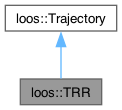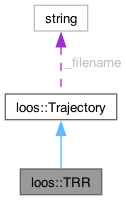Class representing the GROMACS TRR trajectory files. More...
#include <trr.hpp>


Public Member Functions | |
| TRR (const std::string &s) | |
| TRR (const char *p) | |
| TRR (std::istream &is) | |
| std::string | description () const |
| Return a string describing trajectory format. | |
| uint | natoms (void) const |
| float | timestep (void) const |
| uint | nframes (void) const |
| Number of frames in the trajectory. | |
| bool | hasPeriodicBox (void) const |
| GCoord | periodicBox (void) const |
| Returns the periodic box for the current frame/trajectory. | |
| std::vector< GCoord > | coords (void) const |
| Returns the current frames coordinates as a vector of GCoords. | |
| std::vector< double > | virial (void) const |
| std::vector< double > | pressure (void) const |
| std::vector< GCoord > | forces (void) const |
| bool | isDouble (void) const |
| bool | hasVirial (void) const |
| bool | hasPressure (void) const |
| bool | hasCoords (void) const |
| bool | hasVelocities (void) const |
| Whether or not the trajectory format supports velocities. | |
| bool | hasForces (void) const |
| double | time (void) const |
| double | lambda (void) const |
| int | step (void) const |
| bool | parseFrame (void) |
| Parse an actual frame. | |
 Public Member Functions inherited from loos::Trajectory Public Member Functions inherited from loos::Trajectory | |
| Trajectory (const std::string &s) | |
| Automatically open the file named s. | |
| Trajectory (std::istream &fs) | |
| Open using the given stream... | |
| Trajectory (const Trajectory &t) | |
| virtual std::string | filename () const |
| Return the stored filename. | |
| virtual double | velocityConversionFactor () const |
| Conversion applied to velocities to get to \AA/ps. | |
| bool | rewind (void) |
| Rewinds the readFrame() iterator. | |
| void | updateGroupCoords (AtomicGroup &g) |
| Update the coordinates in an AtomicGroup with the current frame. | |
| virtual std::vector< GCoord > | velocities (void) const |
| Returns the current frame's velocities as a vector of GCoords. | |
| void | updateGroupVelocities (AtomicGroup &g) |
| void | seekNextFrame (void) |
| void | seekFrame (const uint i) |
| bool | readFrame (void) |
| Reads the next frame in a trajectory, returning false if at the end. | |
| bool | readFrame (const int i) |
| Reads a specific frame in a trajectory. | |
| bool | atEnd () const |
| uint | currentFrame () const |
Static Public Member Functions | |
| static pTraj | create (const std::string &fname, const AtomicGroup &model) |
Additional Inherited Members | |
 Public Types inherited from loos::Trajectory Public Types inherited from loos::Trajectory | |
| typedef boost::shared_ptr< std::istream > | pStream |
 Protected Member Functions inherited from loos::Trajectory Protected Member Functions inherited from loos::Trajectory | |
| void | setInputStream (const std::string &fname) |
| void | setInputStream (std::istream &fs) |
 Protected Attributes inherited from loos::Trajectory Protected Attributes inherited from loos::Trajectory | |
| pStream | ifs |
| bool | cached_first |
| std::string | _filename |
| uint | _current_frame |
Detailed Description
Class representing the GROMACS TRR trajectory files.
The TRR format can technically have differing numbers of atoms or even components (ie coords, velocities, forces) per frame. This is supported by LOOS, to an extent. If the components vary, then so long as there are coordinates, there should be no problem. If the number of atoms vary and you're using the updateGroupCoords() function, then care must be taken that the group matches the frame. Recall that the atomids are actually indices into the trajectory frame (ie atomid 1 takes its coords from the first trajectory coordinate, etc).
The TRR format can be written in either a single or double precision format. Internally, LOOS will read in either and translate it into whatever the default size is for LOOS (ie GCoord, which by default is a double). Metadata, such as lambda, or box sizes, are always upconverted to double by LOOS.
Since the TRR frame size is not fixed, the entire trajectory will be quickly scanned to build up an index of where the frames begin (see the loos::XTC class for more information).
Finally, note that GROMACS stores data in nm whereas LOOS uses angstroms, so coordinate/box data will be automatically scaled by LOOS.
Member Function Documentation
◆ coords()
|
inlinevirtual |
Returns the current frames coordinates as a vector of GCoords.
Some formats, notably DCDs, do not interleave their coordinates. This means that this could be a potentially expensive operation.
Implements loos::Trajectory.
◆ description()
|
inlinevirtual |
Return a string describing trajectory format.
Reimplemented from loos::Trajectory.
◆ hasPeriodicBox()
|
inlinevirtual |
Tests whether or not the given frame/trajectory has periodic boundary information. The presence of periodic box information does not necessarily indicate that said information has been read in yet. For example, the presence of crystal data is in the header so this can be detected before any frame is read, but the crystal data itself is only read when a frame is read in.
Implements loos::Trajectory.
◆ hasVelocities()
|
inlinevirtual |
Whether or not the trajectory format supports velocities.
Reimplemented from loos::Trajectory.
◆ natoms()
|
inlinevirtual |
of atoms per frame
Implements loos::Trajectory.
◆ nframes()
|
inlinevirtual |
Number of frames in the trajectory.
Implements loos::Trajectory.
◆ parseFrame()
|
inlinevirtual |
Parse an actual frame.
parseFrame() is expected to read in a frame through the Trajectory's StreamWrapper. It returns a bool indicating whether or not it was able to actually read a frame (i.e. false indicates EOF).
Implements loos::Trajectory.
◆ periodicBox()
|
inlinevirtual |
Returns the periodic box for the current frame/trajectory.
Implements loos::Trajectory.
◆ timestep()
|
inlinevirtual |
GROMACS trajectories do not define a timestep value as DCD does
Implements loos::Trajectory.
The documentation for this class was generated from the following files:
- src/trr.hpp
- src/trr.cpp